Content
- 1 What medicinal verbena looks like
- 2 The composition and value of medicinal verbena
- 3 Medicinal properties of verbena
- 4 Useful properties of verbena herb
- 5 What Verbena Cures
- 6 The use of verbena officinalis
- 7 Limitations and contraindications
- 8 Harvesting and storage of medicinal verbena leaves
- 9 Conclusion
Verbena officinalis is a plant that has a positive effect on various organ systems (genitourinary, cardiovascular, respiratory, and others). It is used both externally and internally in the form of infusions or decoctions.
What medicinal verbena looks like
Verbena is a perennial herb that belongs to the genus of the same name and the Verbena family. Along with the scientific name, other (folk) variants are also common:
- witch plant;
- holy herb;
- iron ore;
- the tear of Juno.
The height of medicinal verbena (pictured) is small - on average 10-60 cm. The stem is erect, the root is very powerful. Flowers begin to form in mid-summer. They gather in ear-type inflorescences, and the upper ones - in a panicle. The fruits are formed in early autumn, they are brown dry nuts, from which seeds fall out.
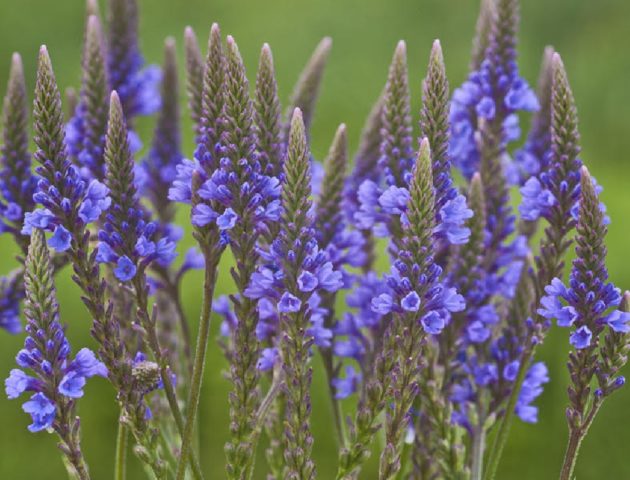
Verbena officinalis gives numerous small flowers of blue and lilac shades
Where does Verbena officinalis grow?
Medicinal verbena is a very unpretentious herb, so it is found in regions with different climates:
- Eurasia;
- America - North and Central Regions;
- Africa and Australia - in separate areas.
In Russia, vervain is mainly harvested in the Caucasus and the Urals, sometimes it can be found in Siberia. The culture is not specially grown - the grass is considered weed and it is often weeded out from the beds, but it has useful properties. In order not to accidentally remove useful grass from the garden, you need to learn how to identify it by external signs.
The composition and value of medicinal verbena
The beneficial properties of verbena officinalis are associated with essential oil, which is concentrated in almost all parts of the plant: in the roots, stems and leaves. Various compounds are present in the oil:
- tannins;
- flavonoids;
- steroids;
- vitamin C;
- carotenoids;
- triterpenoids;
- bitterness (glycosides).
Also, essential oil contains silicic acid and various trace elements. They normalize metabolism and have a beneficial effect on all organ systems.
What parts of the plant are used for treatment
Medicinal raw materials include the entire aboveground (green) and underground parts of the plant:
- leaves;
- stem;
- flowers;
- roots.
Medicinal properties of verbena
Due to its rich chemical composition, verbena provides tangible benefits to the body. It helps in the treatment of various diseases:
- skin disorders (eczema, psoriasis, scabies);
- skin damage (wounds, furunculosis, scratches, abscesses);
- allergic reactions, rash, itching;
- SARS, cough, runny nose, tonsillitis;
- insomnia, chronic fatigue;
- cystitis, urethritis and other kidney pathologies;
- bronchitis and bronchial asthma;
- joint diseases (arthritis, rheumatism, gout).
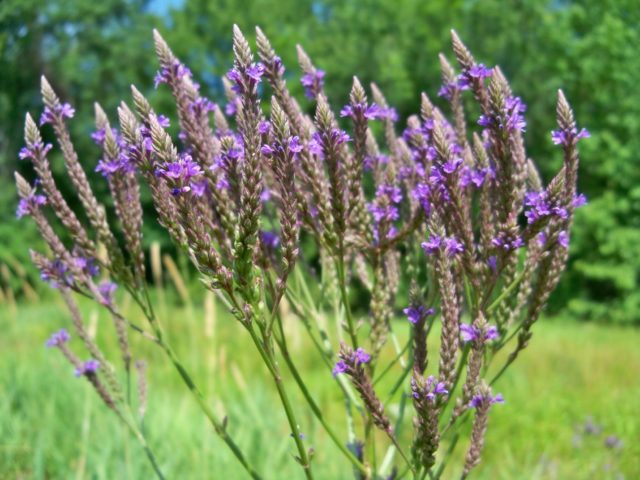
The herb has a positive effect on all organs
The beneficial properties of verbena tea
Verbena tea also has beneficial properties. It provides:
- strengthening the immune system;
- decreased fever;
- coughing up phlegm;
- help in the treatment of ulcers and gastritis;
- improving liver and kidney function;
- diuretic effect.
Tea can be taken on the basis of a single herb or a mixture. At the same time, it is not sold in pharmacy fees, so you need to make up such blends yourself.
Benefits of Verbena Essential Oil
The benefits of verbena essential oil are associated with vitamins, minerals, glycosides, steroids and other biologically active substances of plant origin. The mixture is applied externally to rejuvenate the skin, improve hair growth, and also for inhalation.
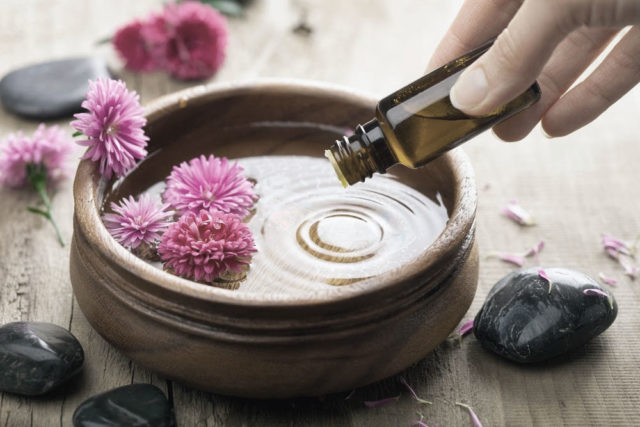
The aroma of the essential oil improves mood, concentration and performance
It is noted that it also has the beneficial properties of an aphrodisiac - it attracts the attention of the opposite sex and awakens desires. Therefore, the oil can be used for aromatherapy both at home and at work.
Useful properties of verbena herb
The components of medicinal verbena stimulate metabolism, give a diaphoretic effect, due to which the body is cleansed of toxins, fatty substances and other metabolic products. Verbena also has other beneficial properties. It causes an expectorant, diuretic, immunomodulatory effect.
Biologically active ingredients stimulate appetite and improve digestion. With regular external use (baths, lotions), decoctions rejuvenate the skin and make it more attractive.
The benefits of verbena for a woman's body
The use of medicinal verbena is especially beneficial for women's health:
- the normalization of the menstrual cycle occurs;
- with its help, disorders associated with menopause are treated;
- the herb has a tonic effect under reduced pressure;
- the condition of women with vegetative-vascular dystonia improves.
What Verbena Cures
Medicinal verbena contains several groups of organic substances and minerals, so it has benefits for different body systems. Most often it is used in the treatment of blood vessels and skin problems, but it is effective for many other disorders.
Verbena - a medicine for blood vessels
The systematic use of the herb allows you to clear blood vessels of bad cholesterol, which increases the risk of heart attack and stroke. Also, the components of medicinal raw materials slightly increase blood pressure, which is important for hypotensive patients.
Verbena treatment of skin diseases
The herb is used as a natural antiseptic. Compresses and lotions produce a wound-healing effect, stimulate the healing of the skin with various injuries - scratches, abrasions, small hematomas (bruises).
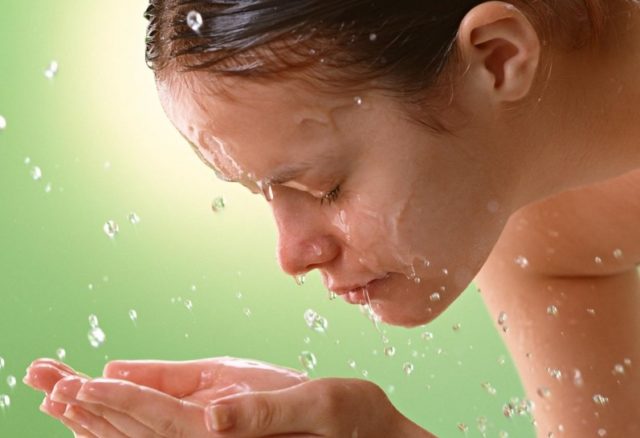
Decoctions help to cope with acne, boils, various rashes, eczema, furunculosis and other skin diseases
Infusions promote skin rejuvenation and wound healing.
The benefits of verbena for colds and flu
It is advisable to use decoctions in late autumn and winter to increase immunity and prevent respiratory diseases. During a cold, it is necessary to take a glass of broth during the day along with honey or raspberry jam. Verbena has a diaphoretic effect - the body quickly warms up, toxins and other harmful substances leave the body.
For insomnia and migraines
The benefits of the internal use of infusions or decoctions are also manifested in the normalization of hormonal levels, which is especially important after pregnancy, with PMS and menstrual irregularities. It is easier for the body to enter the correct rhythm - sleep becomes healthy, problems with insomnia disappear.
Taking the drug allows you to cope with migraines and chronic headaches. It also leads to improved mood and quality sleep.
For menstrual irregularities
The infusion shows useful properties for short-term menstruation, violation of the term, delay. Also, the use of the medication allows you to cope with itching in the vagina.
With overstrain and physical fatigue
Verbena is also beneficial for constant fatigue caused by hard work, stress, physical activity. It stimulates metabolism and tones blood vessels. The aroma of the essential oil is uplifting.
The use of verbena officinalis
Medicinal verbena almost always benefits the body. The tool is used only in the form of aqueous infusions or decoctions (internally and externally). It is not prepared in large quantities: it is better to insist 1-2 glasses every day.
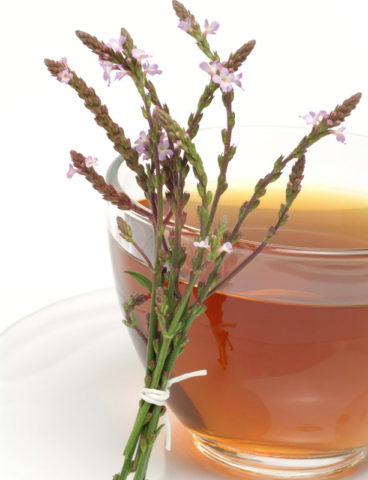
For treatment, raw materials are steamed in boiling water
The use of vervain in traditional medicine
The healing properties of verbena have long been known in folk medicine. The medicine is used in the form of an aqueous infusion and decoction. For external use, use this option:
- medicinal verbena - 3 tbsp. l .;
- boiling water - 500 ml.
The mixture is infused for three hours, and it is better to do this in a thermos so that the liquid remains hot. Then it is filtered and applied externally in the form of compresses and baths for accelerated healing of scratches, wounds, ulcers and other injuries.
Another option for water infusion:
- medicinal verbena - 1 tablespoon;
- boiling water - 1 glass (200-250 ml).
Insist an hour and filter. Then it is applied orally for a third of a glass 3 times a day 20-30 minutes before meals.
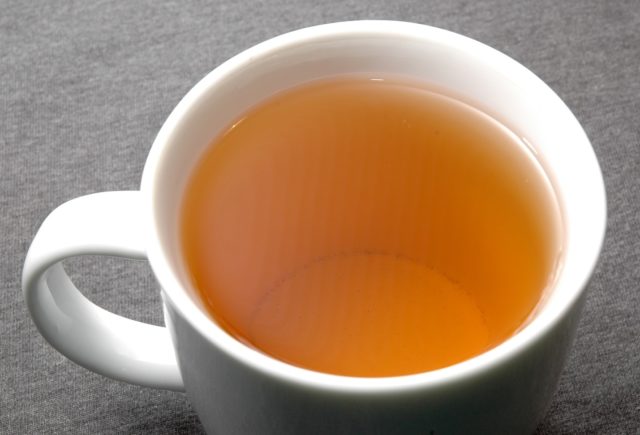
Every day in the morning they prepare a fresh broth and repeat the cycle.
This remedy has beneficial properties for raising immunity, increasing appetite, and improving digestion. It can also be used to rinse the mouth for stomatitis or sore throat. The broth is used externally for treatment:
- acne;
- rashes;
- eczema;
- neurodermatitis;
- allergic diseases;
- psoriasis;
- burns;
- wounds;
- pustules.
Another option is a water decoction:
- medicinal verbena - 1 tbsp. l .;
- boiling water - 500 ml.
The water is brought to a boil, after which the crushed raw materials are added to it, the mixture is boiled for 5 minutes over low heat and filtered. Then add warm boiled water to bring the volume to the original (500 ml). The broth benefits in the form of enhancing immunity. It can be used for colds along with raspberry jam or honey (a quarter cup 4 times a day 20-30 minutes before meals).
A glass of the finished liquid is added to a hot bath and taken for 30-60 minutes every day. This allows you to cleanse the pores - together with sweat, salts, processed products and other toxins leave the body.
The use of verbena in cooking
In cooking, verbena officinalis is not widely used. It is mainly used as a spice that goes into pickles and pickles along with dill, anise and other herbs with a bright aroma.
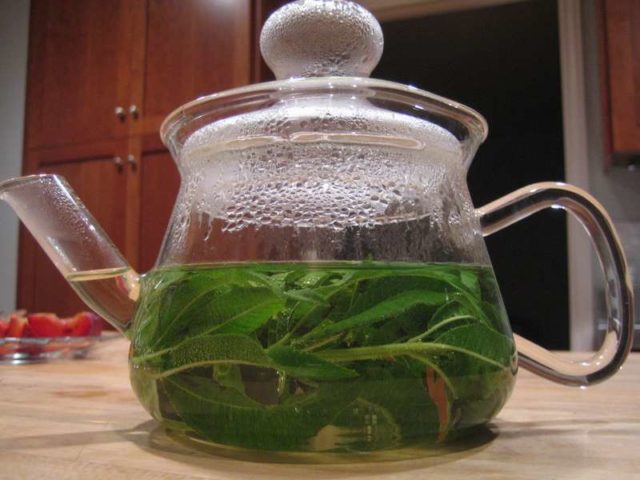
Verbena officinalis is used for brewing tea
Both the aerial part of the plant and the roots are cut off.
Application of the properties of verbena in cosmetology
Verbena medicinal has beneficial properties for the skin, therefore it is used in cosmetology. Baths and compresses give a healing effect:
- the skin becomes more elastic and looks younger;
- fine wrinkles are smoothed;
- the secretion of sebum is normalized, making the face and body appear more attractive;
- dandruff is eliminated;
- hair begins to grow better;
- acne, rash and other unpleasant symptoms disappear.
For skin rejuvenation, it is recommended to regularly wash your face with a warm infusion of verbena officinalis:
- chopped grass - 1 tbsp. l .;
- boiling water - 1 glass.
Insist 1 hour, strain, divide into 2 parts and wash your face. The same broth (prepare another 1 glass) has a beneficial effect on the entire skin. It can be added to an evening bath.
A mask of the following components will be useful for hair:
- oil: verbena - 10 tbsp. l., castor - 2 tbsp. l .;
- aloe extract - 2 tsp;
- honey - 1 tsp.
All components are mixed and rubbed into the skin, and then distributed through the hair. Stand for one hour and wash off.
Limitations and contraindications
The uncontrolled use of medicinal verbena, like other drugs, is quite dangerous, especially for people with chronic diseases, as well as after surgery.
Vervain should be used with caution:
- pregnant women;
- nursing mothers;
- children under 12-14 years old.
During pregnancy and lactation, you should consult a doctor about herbal medicine. The fact is that decoctions and teas from this herb in large quantities can even lead to premature birth. Children under 5 years old should be excluded from taking verbena.
The herb is contraindicated for people:
- suffering from hypertension;
- after a stroke or heart attack;
- allergy sufferers with individual intolerance to individual components of raw materials.
Taking any medicine for too long has an effect on metabolic processes and on the body in general. In this case, the beneficial properties of verbena may not be as noticeable compared to the negative consequences.
For example, uncontrolled intake can lead to irritation of the intestinal mucosa. Thus, it is better for patients with digestive disorders to first consult a doctor and only then begin a course of treatment under supervision.
In the event of extraneous symptoms (heaviness in the abdomen, indigestion, allergic reactions), the use of verbena is immediately stopped.
Harvesting and storage of medicinal verbena leaves
All parts of the plant, including flowers, are used for treatment.
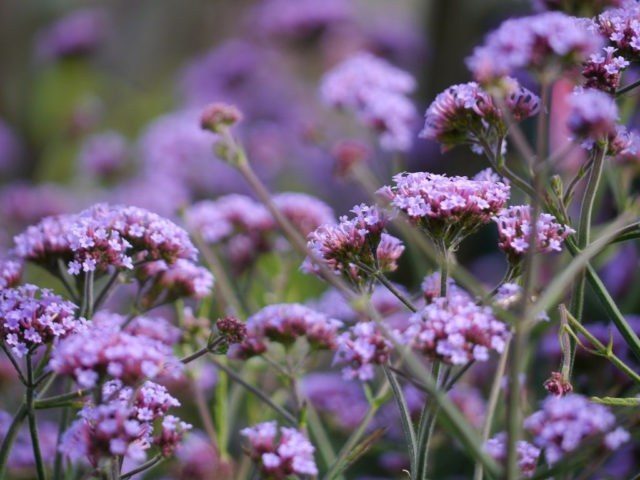
The collection of medicinal verbena is carried out during the flowering period, which falls on the second half of summer and early autumn (until the end of September)
It is at this moment that plant tissues produce the maximum amount of valuable essential oil. Then the stems, leaves and flowers are dried, crushed and harvested for further storage in a dry, dark place.
The only exception is roots. It is better to harvest them in spring or autumn. The roots are also dried in the fresh air, after which they are crushed and stored. The whole process can be automated using special dryers.
Conclusion
Verbena officinalis has a healing effect on the body. Regular use improves mood, tones, improves sleep and appetite. But this remedy is not a panacea (like everyone else). Therefore, along with its intake, physical activity, nutritional adjustment and rejection of bad habits are necessary.








